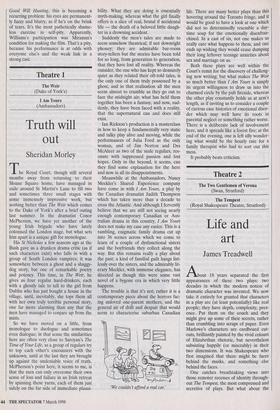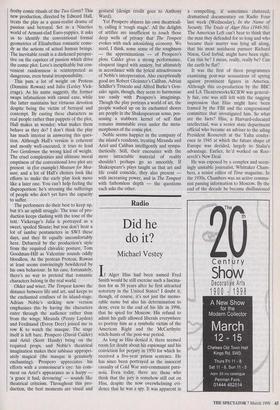Theatre 2
The Two Gentlemen of Verona (Swan, Stratford) The Tempest (Royal Shakespeare Theatre, Stratford)
Life and art
James Treadwell
About 18 years separated the first appearances of these two plays: two decades in which the modern notion of dramatic character was invented. We now take it entirely for granted that characters in a play are (at least potentially) like real people; they have depth, complexity, pres- ence. Put them on the couch and they might give up some of their secrets, rather than crumbling into scraps of paper. Even Marlowe's characters are cardboard cut- outs, brilliantly painted by the vivid colours of Elizabethan rhetoric, but nevertheless subsisting happily (or miserably) in their two dimensions. It was Shakespeare who first imagined that there might be faces behind the masks, and something else behind the faces.
One catches breathtaking views into those remoter recesses of identity through- out The Tempest, the most compressed and secretive of plays. But what about the frothy comic rituals of the Two Gents? This new production, directed by Edward Hall, treats the play as a quasi-realist drama of passion and betrayal. Set in a Nineties world of Armani-clad Euro-yuppies, it asks us to identify the conventional formal geometries of Elizabethan romantic come- dy as the actions of actual human beings. The inevitable result is a darkened perspec- tive on the caprices of passion which drive the comic plot. Love's inexplicable but con- venient randomness is reinterpreted as dangerous, even brutal irresponsibility.
This puts a lot of weight on Proteus (Dominic Rowan) and Julia (Lesley Vick- erage). As his name suggests, the former swaps infatuations with casual ease, while the latter maintains her virtuous devotion despite being the victim of betrayal and contempt. By casting these characters as real people rather than puppets of the plot, Hall makes us wonder: what makes them behave as they do? I don't think the play has much interest in answering this ques- tion. Although Hall's version is coherent and mostly well-executed, it tries to lend Two Gentlemen the wrong kind of weight. The cruel complexities and ultimate moral emptiness of the conventional love plot are present in (for example) Measure for Mea- sure, and a lot of Hall's choices look like efforts to make the early play look more like a later one. You can't help feeling the disproportion: he's stressing the sufferings of people who don't yet have the capacity to suffer.
The performers do their best to keep up, but it's an uphill struggle. The tone of pro- duction keeps clashing with the tone of the text. Vickerage's Julia is portrayed as a sweet, spoiled Sloane; but you don't hear a lot of iambic pentameters in SW3 these days, and they fit equally uncomfortably here. Debarred by the production's style from the required chivalric posture, Tom Goodman-Hill as Valentine sounds oddly bloodless. As the protean Proteus, Rowan at least seems convincingly bewildered by his own behaviour. In his case, fortunately, there's no way to pretend that romantic characters belong in the real world.
Older and wiser, The Tempest knows the distance between life and art, and keeps to the enchanted confines of its island-stage. Adrian Noble's striking new version emphasises this by having the characters enter through the audience rather than from the wings; Miranda (Penny Layden) and Ferdinand (Evroy Deer) joined me in row K to watch the masque. The stage itself is left bare. Prospero (David Calder) and Ariel (Scott Handy) bring on the required props, and Noble's theatrical imagination makes their tableaux appropri- ately magical (the masque is genuinely enchanting). Prospero appreciates his efforts with a connoisseur's eye: his com- ment on Ariel's appearance as a harpy 'a grace it had, devouring' — sounds like theatrical criticism. Throughout this pro- duction, the best moments are visual and gestural (design credit goes to Anthony Ward).
Yet Prospero abjures his own theatricali- ty, calling it 'rough magic'. All the delights of artifice are insufficient to touch those deep wells of privacy that The Tempest evokes with such astonishing economy. We need, I think, some sense of the roughness — the approximations — of Prospero's plots. Calder gives a strong performance, eloquent tinged with anxiety, but ultimately in accordance with the lyrical attractiveness of Noble's interpretation. Also exceptionally good are Robert Gleinster's Caliban, Adrian Schiller's Trinculo and Alfred Burke's Gon- zalo: again, though, they seem to harmonise too easily with Prospero's imaginings. Though the play portrays a world of art, the people washed up on its enchanted shores are people in the Shakespearean sense, pos- sessing a stubborn kernel of self that remains immutable even under the meta- morphoses of the comic plot.
Noble seems happier in the company of the island's residents, treating Miranda and Ariel and Caliban intelligently and sympa- thetically. Still, their encounter with the more intractable material of reality shouldn't perhaps go so smoothly. If Shakespeare's plays taught us that art and life could coincide, they also present with increasing power, and in The Tempest with fathomless depth — the questions each asks the other.



























































 Previous page
Previous page